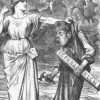
Judith L. Fisher, “Tea and Food Adulteration, 1834-75”
This essay examines the adulteration of tea in the contexts of free trade and the politics of empire. It contends that the importance of tea as a healthful, particularly British drink made the adulteration of the beverage a significant matter for social and moral concern. Adulterated tea was primarily from China and so was typed as “foreign” and unclean in contrast to tea imported from Assam, India, that was defined as “British” and healthy.

Ellen Rosenman, “On Enclosure Acts and the Commons”
Between 1750 and 1850, approximately 4000 Enclosure Acts were passed converting commonable land into the exclusive private property of large landowners. According to the working-class politics of the late eighteenth and nineteenth centuries, these acts impoverished small farmers and destroyed the agrarian way of life that had sustained families and villages for centuries. Historians have debated this account of their effects, but for the politicized working classes the Enclosure Acts represented a profound trauma, an extended moment in a narrative of dispossession that undergirded resistance to aristocratic power and urbanization.

Amy Woodson-Boulton, “The City Art Museum Movement and the Social Role of Art”
British art museums developed along substantially different lines than those in Continental Europe. Rather than create a centrally supported or designed system of cultural provision, the British Parliament passed permissive legislation in the middle of the nineteenth century that allowed localities to choose to establish public libraries and museums. Cities thus founded art museums independently, at the instigation of committed local reformers and benefactors, while most national institutions proceeded by Parliamentary acts rather than through the nationalization of royal collections. A generation later, inspired by the works of John Ruskin and the new aesthetic of Pre-Raphaelitism, many men (and some women) pushed their cities to create art museums not primarily as a means to educate the public about art history, but to counteract the toxic effects of the moral and physical ugliness of industrial capitalism, and of industrial cities in particular. The resulting institutions formed a new kind of domesticated public space, bringing together ideas about the middle-class home as a refuge and about beauty as a means of “improving” the working classes. However, John Ruskin himself often criticized these efforts as too accommodating of industrial society.

Tom Mole, “Romantic Memorials in the Victorian City: The Inauguration of the ‘Blue Plaque’ Scheme, 1868”
The ‘Blue Plaque’ scheme, which places memorial tablets on houses in London once occupied by distinguished people, was inaugurated in 1868, when the Royal Society of Arts placed the first plaque on the house in Holles Street (off Oxford Street) where Lord Byron was born. This was the first of many plaques: at least 33 were in place by the end of the century, with more planned. The distinctive blue circular design was adopted in 1901 and the scheme continues to operate today under the management of English Heritage. This essay argues that the scheme drew on key Romantic ideas about commemorative practice, expressed by William Godwin, William Wordsworth and Samuel Rogers, as well as memorialising Romantic authors. It suggests that the “Blue Plaques” should be read in the context of a number of pantheonic initiatives undertaken during the period of the Reform agitation, which aimed to promote cultural consensus in the present, by creating consensus about the noteworthy individuals of the past.

Kristi N. Embry, “The Entente cordiale between England and France, 8 April 1904″
The Entente cordiale was a series of formal political agreements signed in 1904 that negotiated the peace between England and France. French for “warm understanding,” the Entente cordiale of 1904 settled more immediate disputes between England and France in Egypt, Morocco, and elsewhere in Africa. Perhaps more famously, the series of agreements signed in 1904 contributed to the harmonization of relations between the two countries in the twentieth and twenty-first centuries. But, as I show here, the Entente cordiale of 1904 also served as the culmination of a more informal—and precarious—entente that had slowly developed between the former enemies beginning in the 1830s and 1840s.

Alexander J. Dick, “On the Financial Crisis, 1825-26”
The crash of 1825-1826 was the first modern financial crisis. Unlike earlier speculative bubbles, the 1825 crisis was not caused only by exogenous circumstances like war or overzealous investment. The real cause of the 1825 crisis was the diversification of the finance economy into tiny investment units—a loan here, an insurance policy there—offered as seemingly responsible ways to maintain credit and generate capital. When the market finally did crash, no single group or class could be blamed for causing it. Economists came to realize that the market was always at the mercy of booms and busts and that no single individuals or professions within it could be said to be in charge of it. In other words, 1825 marks the moment at which capitalism grew from an ideological enterprise into a global condition. 1825 also marks a crucial transition in the publishing industry, the point at which the traditional market for vellum-bound epics and triple-decker novels was eclipsed by cheap reprints and serial publications. It thus signals the end of what we might call the Romantic ideal and the emergence of an existential malaise in English literature that persists in Victorian writing and beyond.

Elaine Hadley, “On Opinion Politics and the Ballot Act of 1872”
This article argues that opinion politics is one of the most significant developments in the nineteenth century, and does so by focusing in part on the Ballot Act of 1872. It provides a quick overview of the scene of elections prior to the reforms of 1832 and 1867 in order to highlight the emergence of the opinionated, purposive individual as the agent and medium of politics. it describes the mid-century variant of this political individual, the focus at this moment on the cognitive procedures of opinion formation, and the stresses this commitment produced in the political domain. It also briefly describes the late-century changes in opinion politics, and notes its continued salience in present-day politics.

Annemarie McAllister, “On the Temperance Movement”
Temperance movements in Britain developed in a parallel, but significantly different, direction to those in the United States. Although there was a desire to control drinking by legislation, moral suasion was much more central and tended to fall into particular categories of argumentation. The discourses of temperance drew on religion, but developed their own categories, myths, and iconography, verbal and visual. An appreciation of this propaganda leads to a greater understanding of the landscape of popular culture in Britain in the nineteenth century.

Kelly Hager, “Chipping Away at Coverture: The Matrimonial Causes Act of 1857”
The Matrimonial Causes Act of 1857 made divorce legal under British law and was the first law to protect a wife’s property. It was thus the second piece of legislation (after the 1839 Custody of Infants Act) to require Parliament to examine the ramifications of the common law doctrine of coverture; the passage of these two acts began to chip away at that cruel precedent. While the bill originally introduced in 1854 was procedural in nature—designed to remedy the anomaly of a legal system that granted divorces by Private Act of Parliament though divorce was, strictly speaking, illegal—by the time it became law, three years later, the public debate over the rights of married women had become so heated that the final version of the bill not only put divorce on the books and made it straightforwardly and absolutely legal, but also provided for the protection of divorced, separated, and deserted wives.

Marjorie Stone, “Joseph Mazzini, English Writers, and the Post Office Espionage Scandal: Politics, Privacy, and Twenty-First Century Parallels”
In 1844, an English radical MP affiliated with the Chartist movement petitioned the House of Commons, charging that Sir James Graham, Secretary of State for the Home Office, had secretly authorized the opening of the letters of exiled Italian nationalist and resident of London, Joseph Mazzini, spying upon their contents. The ensuing Post Office espionage scandal is a pivotal event in British and European history, represented—like Mazzini himself—from conflicting perspectives and shaping a host of subsequent developments. It provoked “anti-Graham” envelopes and parodies in Punch, intensified British sympathy for the Italian liberation and unification movement for which Mazzini was the principal theorist, and influenced British policy towards the 1847-49 revolutions in Italian states struggling for independence from Austrian overlords and autocratic Bourbon kings. The scandal and the networks it forged also shaped British party politics, Chartist international alliances, and emerging conceptions of rights to privacy and limits on state surveillance. Mazzini, revered as an apostle by many, was viewed as a dangerous subversive by many others, including the Pope and Prince Klemens von Metternich, Foreign Secretary to the Austrian Empire, later one of Henry Kissinger’s diplomatic models. As the scandal unfolded, evidence indicated that Graham and the Foreign Secretary Lord Aberdeen shared information from Mazzini’s letters with the Austrians, linking British espionage to the execution of the Bandiera brothers, Italian revolutionaries, in Naples in July 1844. This essay surveys diverse responses to Mazzini and the literary and cultural as well as the political repercussions of the 1844 scandal. Prominent English writers, notably Thomas Carlyle, came to Mazzini’s defence, especially indignant over violations of privacy, while others—including Robert Browning, Elizabeth Barrett Browning, George Meredith, Algernon Charles Swinburne, and George Eliot—went on to write works influenced by the charismatic, controversial Italian nationalist. An epilogue notes some of the 1844 event’s parallels with current controversies over communications hacking (WikiLeaks, the News of the World phone hacking) and appropriate limits on state secrecy and surveillance in the wake of 9/11, 7/7, anti-terrorism legislation, and the “rendition” of information and/or persons such as Canadian-Syrian Maher Arar to oppressive regimes by democratic countries.
